
88 Writers on the Books They Loved in 2022
The Year in Reading From Contributors to Freeman’s
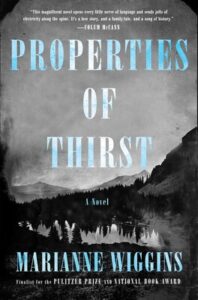
Marianne Wiggins, Properties of Thirst
“You can’t save what you don’t love.” So begins Marianne Wiggins’ lovesong, Properties of Thirst, published earlier this year. The truths become even more profound as the novel progresses. Set in the deteriorating moral landscape around World War Two, it’s funny and it’s tender and it’s smart and it’s humble, all the time prying open the territories of the heart.
–Colum McCann, author of Apeirogon

Luke Healy, The Con Artists
I’ve been reading more graphic novels lately, especially since I started translating them, and it’s opened up a whole new world for me. My favorite read this year has been Luke Healy’s The Con Artists, a funny, bleak, and whimsical tale of friendship between two childhood frenemies Frank and Giorgio. Snippets of Frank’s stand-up routine break up the spare writing and crisp minimalist lines, as Healy questions what is real and what is fiction in this age of social media. And the fact that it’s a comic (book) about a comic (comedian)—how perfect is that? I’ll be talking about the understated brilliance of this book for a long time.
–Janet Hong, writer and translator of Yeong-shin Ma’s Artist
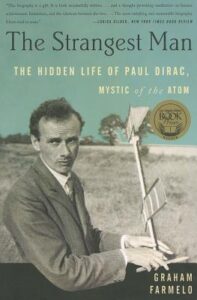
Graham Farmelo, The Strangest Man: The Hidden Life of Paul Dirac, Mystic of the Atom
I don’t want to talk about my favorite 2022 book right now because that just takes time away from the one I’m reading, Salmon Rushdie’s unputdownable Joseph Anton: A Memoir (“Joseph Anton” was Rushdie’s pseudonym during his years in hiding). Lucasta Miller’s Keats: A Brief Life in Nine Poems and One Epitaph kept me in shape this year, because I kept having to put it down and take a long walk to keep from crying. But overall, my 2022 fave is The Strangest Man: The Hidden Life of Paul Dirac, Mystic of the Atom by Graham Farmelo.
An intimate of Einstein, Heisenberg, Niels Bohr, and the other great physicists of the last century, Dirac helped discover quantum mechanics and predicted the existence of antimatter, for which he won the 1933 Nobel Prize. He really was the strangest man: he didn’t take care of himself, he was known for giving one-syllable replies or none at all to questions, and he often ate entire meals with others without saying a word. Fun fact: in his final years, Dirac taught at Florida State University, where I teach, and the several times my path crossed his, I involuntarily reached for my wallet to help someone who looked destitute before realizing that the man with missing teeth and a stained jacket was one of the towering figures of our time.
–David Kirby, author of Help Me, Information: Poems
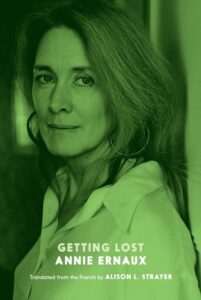
Annie Ernaux, Getting Lost
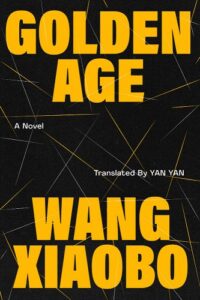
Wang Xiaobo, Golden Age
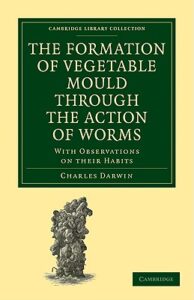
Charles Darwin, The Formation of Vegetable Mould Through the Action of Worms
This year has been more eventful than the last. I had finally felt a sense of hope in coming out of the pandemic but then Putin’s absurd and monstrous war in Ukraine dragged me back to despondency. I read more than the last year. One of the highlights is Annie Ernaux’s Getting Lost, translated by Alison L. Strayer. The incredible intensity transmitted in this piece is as powerful as her previous works such as Happening. I also read the English edition of Golden Age by the late Chinese writer Wang Xiaobo, excellently translated by Yan Yan.
At once hilarious and charged with serious political discourse, Golden Age is truly a tour de force. It demonstrates that Wang Xiaobo is amongst the most original writers in post-Mao China. Last but not the least, there is a book I have been meaning to read for years now but only got to last month—The Formation of Vegetable Mould Through the Action of Worms by Charles Darwin.
The first edition was published in 1881. I was amazed by the way Darwin described the earthworms’ life and physiology, so detailed and so attentive for such a ‘small book of little moment’ in his own words. It is even more incredible just to think that Darwin died a year after writing such a curious work.
–Xiaolu Guo, author of Radical, forthcoming in April 2023 from Chatto and September 2023 from Grove
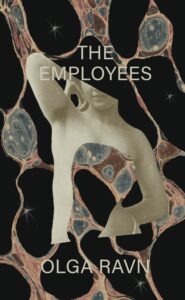
Olga Ravn, The Employees
Olga Ravn’s novel The Employees (translated by Martin Aitken) asks big questions about work, pleasure and pain, focusing on what we lose when we ignore that we have bodies. A homesick love letter to humanity, written from outer space.
–Sam Bett, translator of The Flowers of Buffoonery, by Osamu Dazai, forthcoming from New Directions in 2023
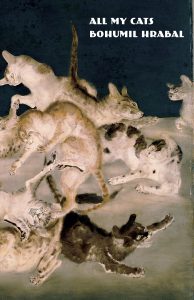
Bohumil Hrabal, All My Cats
I both loved and hated Bohumil Hrabal’s All My Cats, which is an intimate observational account of the author’s adoration, fascination, need, sense of overwhelmedness and then guilt at the growing family of cats he kept at his weekend country cottage east of Prague. I loved the book for its tenderness, and the affecting detail with which he captured life with his feline companions. And hated it for the fear he managed to inspire—in a very short and emotionally suspenseful narrative—of what might happen to his cats: Would they disappear, die, get sick, freeze in the winter? Would he drown the newborn litter that overwhelmed him? At times I closed the book shut to put-off reading what might have happened next.
–Yasmine El Rashidi, author of Chronicle of a Last Summer: A Novel of Egypt
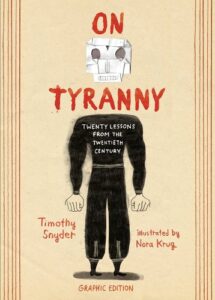
Timothy Snyder and Nora Krug, On Tyranny: Twenty Lessons from the Twentieth Century
I loved reading On Tyranny: Twenty Lessons from the Twentieth Century, by author Timothy Snyder and illustrator Nora Krug. The book was originally published in paperback in 2017, then re-published as an illustrated “graphic edition” by Ten Speed Press of Penguin Random House.
The book explores the mechanisms through which authoritarian regimes of both the political left and the political right rise up, and how they have been resisted. The book is equal parts chilling and inspiring, demonstrating as it does, how many of the brutal, misleading tactics of authoritarianism were deployed by a certain orange manbaby during his 2016-2020 presidency, and how civil society has again and again stood up to dictators and wannabe dictators.
One chapter explores the specialized language that authoritarians use to justify and normalize their extreme policies and violent actions. Another reminds us that “modern tyranny is terror management,” which is to say that authoritarians will exploit disasters, attacks, and terrible events to consolidate power. In one chapter, the authors focus on reality and the truth, and how we must urgently cling to and defend facts and reality, even as authoritarians try to flood the culture with lies, and warp and distort reality to suit their needs.
It is empowering to have an author connect the dots and help one see the whole constellation of interconnected authoritarian tactics, and also to know that people found ways to resist, subvert, and undo authoritarian regimes. My only regret is that I did not pick up this beautifully illustrated book in 2017, just as American authoritarianism was throwing me and so many others off balance as we wondered what it all meant, where it would stop, and how to stop it.
–Jaime Cortez, author of Gordo
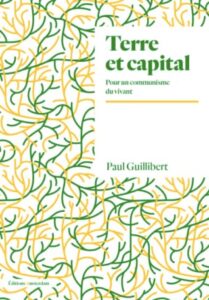
Paul Guillibert, Land and Capitalism: For a Communism of Living Beings
This past year I’ve felt the need to read philosophy again. I found Paul Guillibert’s book, which I hope to be translating soon under the title Land and Capitalism: For a Communism of Living Beings. The book articulates things that I have thought about but felt like I didn’t understand enough to express: how there are dead ends in communism/Marxism but that other possible currents exist; and how there are plenty of ecological movements yet they don’t make as large an impact as I would like. Guillibert explains these things and suggests a way to combine the two in a sort of eco-communism to address the future.
–Matt Reeck is a 2022 Guggenheim Fellow in translation. His most recent translation is Édouard Glissant’s Manifestos, translated with Betsy Wing.
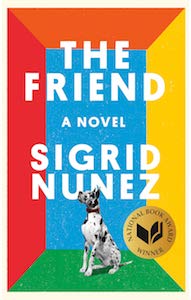
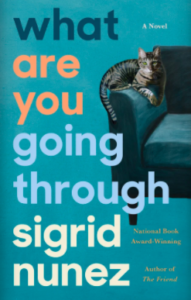
Sigrid Nunez, The Friend and What Are You Going Through
This year, everything slowly went back to normal in Paris, where I live, and paradoxically I found myself feeling a little bit lonely. Call it an afterglow of loneliness in the wake of the pandemic, which had kept us on our toes with its flurries of texts and emails and video meetings, and the general state of hypervigilance and stress it put us through. 2022 was more… muted. I felt a bit unmoored. I was happy to be reunited with friends and family, of course, but I hadn’t anticipated the effort it would take to try and pick up where we left off, and to make sense of each other’s often disjointed experiences.
And so I searched for a friendly voice to help me through the transition. Which is why I spent a tremendous amount of my reading time with Sigrid Nunez. I’ve now read all of her books, I think. The Friend and What Are You Going Through I’ve re-read. The narrative voice struck me as lovable, relatable. But the deep solace I found in those books is structural. Architectural.
At first, both seem digressive—the way a friendly conversation might feel—until you realize that everything falls perfectly into place. They’re so beautifully constructed, these books. Nothing is gratuitous, and so they provide a deep sense of meaning; in a period of doubt, isn’t that the greatest gift of all? To me, they’ve been delicate but enduring shelters. They’ve kept the wind and chaos out but let the light in. They were perfect for my 2022.
–Jakuta Alikavazovic, author of Night as it Falls, translated by Jeffrey Zuckerman
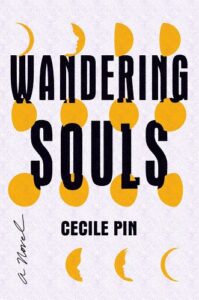
Cecile Pin, Wandering Souls
I was fortunate enough to have read an early copy of Cecile Pin’s debut, Wandering Souls, and what a stunning novel it is. It came to me at a time when I was having trouble finishing books, yet I blazed through it in a day. A poignant and important story following the life of a Vietnamese family in the UK, it is written with so much tenderness and sensibility. This novel comes out in March 2023 and it is a must-read.
–An Yu, author of Ghost Music












